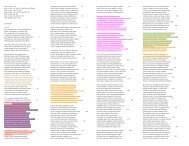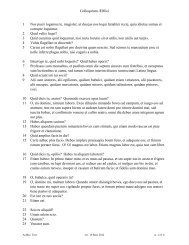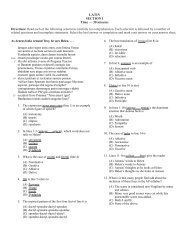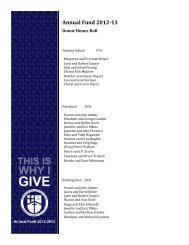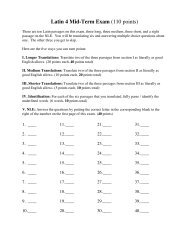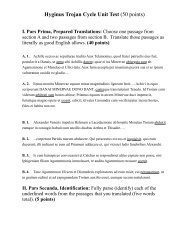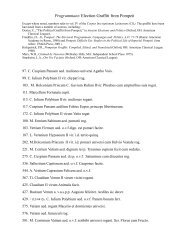Adolescence: The road toward autonomy By Robert A. Horak Jr., Ph ...
Adolescence: The road toward autonomy By Robert A. Horak Jr., Ph ...
Adolescence: The road toward autonomy By Robert A. Horak Jr., Ph ...
You also want an ePaper? Increase the reach of your titles
YUMPU automatically turns print PDFs into web optimized ePapers that Google loves.
<strong>Adolescence</strong>: <strong>The</strong> <strong>road</strong> <strong>toward</strong> <strong>autonomy</strong><br />
<strong>By</strong> <strong>Robert</strong> A. <strong>Horak</strong> <strong>Jr</strong>., <strong>Ph</strong>.D., Counselor and Beamer Carr, Student Body<br />
President<br />
<strong>Adolescence</strong> can be a dreaded time for both parents and youth as changes erupt.<br />
During adolescence, however, qualitative changes present new opportunities for children<br />
as they develop powerful cognitive abilities, sophisticated social skills, and experience<br />
dramatic physical transformations. Throughout this period, many parents would agree<br />
that their goal is to mold their child into a “perfect” adult, typically with such traits and<br />
behaviors as the capacity to develop intimate relationships based on mutual respect and<br />
trust, the execution of ethical decision-making based on personal values, responsibility<br />
to self and others, the coping with stress and adversity in a healthy manner, and the<br />
making of a contribution to the greater community.<br />
It’s difficult, however, to know how to help your children develop into such well-rounded<br />
adults. Perhaps the single most important thing parents may do to help their children<br />
through adolescence is to make a conscious effort to maintain an open relationship with<br />
them. This is essential if parents intend to be tuned in with their children. <strong>By</strong><br />
maintaining an open and trusted relationship, parents can play an active role in their<br />
children’s lives. When parents demonstrate that they will always be available to talk,<br />
listen, and give advice, they build a greater sense of safety and security in their children.<br />
Knowing that they have a parent to fall back on in hard times can help children feel more<br />
confident. Confidence, in turn, is a commodity that helps adolescents make<br />
commitments and deal with ambiguity. Another benefit of upholding a strong bond with a<br />
parent is that it can serve as a model to be emulated in developing positive friendships in<br />
the future.
Parents also must teach their children how to use the freedom that increases as young<br />
folks progress through adolescence. Along with freedom comes the ability to properly<br />
use the freedom, which boils down to responsible and ethical decision-making. With an<br />
increased sense of responsibility, children can gradually be granted more freedom. But,<br />
as a parent, how do you know when your child is mature enough to handle more<br />
freedom? Every child matures at a different rate, but if parents are knowledgeable of<br />
their children’s strengths and weaknesses, parents can accurately gauge when their<br />
children are ready to take on additional responsibilities. <strong>The</strong> key for parents is gradually<br />
to ease their children into accepting new responsibilities. However, giving their children<br />
new freedom doesn’t mean that parents should assume that their children would always<br />
use perfect judgment. <strong>The</strong>refore, parents walk the fine line of knowing when to step in to<br />
help and when to let their children figure out how to deal with the situation themselves.<br />
This is where it would be a mistake to underestimate the value of natural consequences.<br />
Natural consequences are potent means critical for skill development and improved<br />
decision-making.<br />
We may conclude that neither extreme, too much or too little freedom, is desirable<br />
because it does not allow children to learn from their mistakes. While becoming young<br />
adults, children will use poor judgment, make bad choices and abuse their<br />
independence, however, it is how such deviation is handled that will determine if children<br />
ultimately can remain on the correct path to <strong>autonomy</strong> in adulthood. Properly dealing<br />
with the times when children abuse freedom can turn a potentially negative situation into<br />
a positive learning experience. <strong>The</strong>refore, even though parents might give their children<br />
new freedom, it is still their duty to stay active in their children’s life by monitoring them<br />
and remaining open to help guide them. Concurrently, by being able to trust and
communicate with their parents, children can learn from their mistakes and exercise their<br />
will in a smarter and more responsible manner in the future.


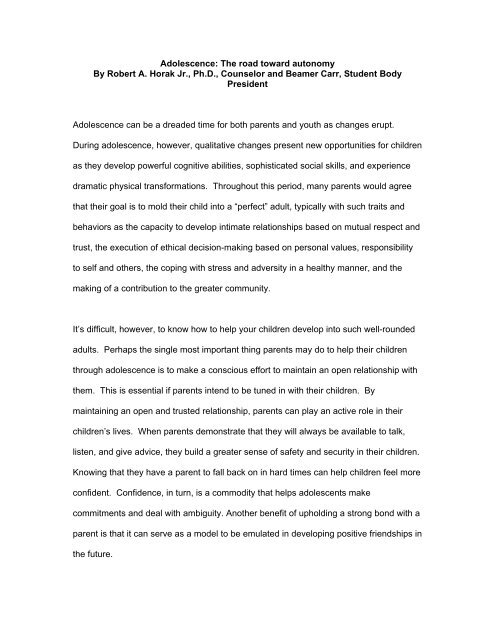

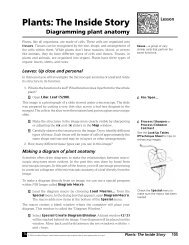
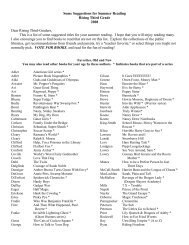
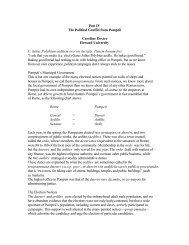
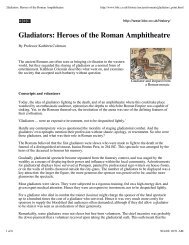
![alumni e-mail addresses by classes - word[3]](https://img.yumpu.com/13381322/1/190x245/alumni-e-mail-addresses-by-classes-word3.jpg?quality=85)
